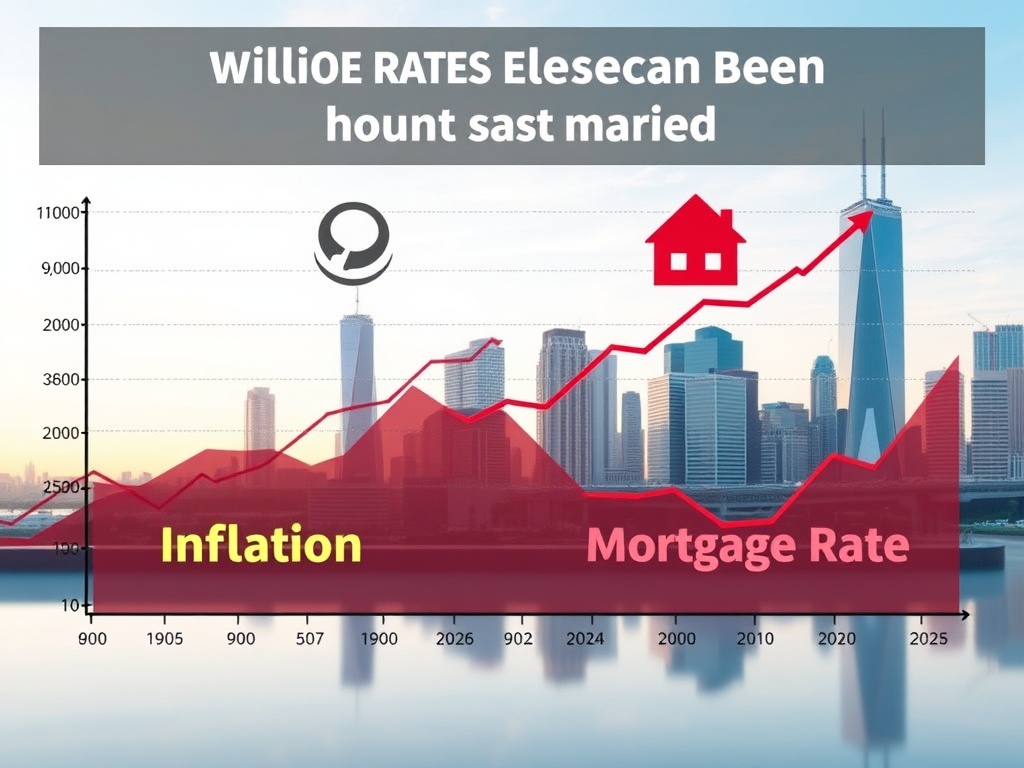Inflation Surge and Its Impact on Mortgage Rates

A significant and unexpected increase in inflation has raised concerns among experts, indicating that a competitive price war among mortgage lenders may be temporarily halted. According to the latest figures released by the Office for National Statistics (ONS) on Wednesday, inflation jumped from 2.5% to 3%. This increase surpassed the predictions made by economists, sparking discussions about its potential implications for the housing market.
Mortgage brokers have voiced concerns that this rise in inflation could lead to the withdrawal of some of the most affordable home loans currently available, many of which are priced below 4%. Lewis Shaw, a prominent mortgage broker at Shaw Financial Services, commented, “Today’s inflation figures paint a grim picture, and how the UK bond market reacts will be crucial in determining how long these new sub-4% mortgage deals remain accessible.” He further added, “I suspect these deals will disappear quickly, which will be disappointing for the thousands of mortgage holders who are due for renewal this year and are hoping for better rates.”
The dynamics of fixed mortgage rates are closely tied to swap rates, which reflect market predictions regarding future interest rates. As inflation rises, the Bank of England may consider maintaining higher interest rates for an extended period. Traders are currently betting against any rate cuts occurring in the immediate future. Coupled with higher-than-anticipated wage growth data released on Tuesday, the outlook suggests that the most favorable mortgage deals may soon become scarce, with fewer new lower-rate options emerging.
Market Reactions and Predictions
David Hollingworth from L&C Mortgages stated, “We’ll be monitoring how the swap markets respond, but it wouldn’t be surprising to see them edge higher again. Today’s data could significantly hinder any ongoing momentum for fixed-rate cuts. With lenders operating on tight margins, we might see fixed rates either stabilize or, at worst, face upward pressure.” This indicates that the lowest fixed-rate deals currently available might be short-lived, especially given the strong demand from borrowers eager to secure competitive rates.
Aaron Strutt from Trinity Financial echoed these sentiments, saying, “Clearly, this is not encouraging news and could easily mean that the anticipated reductions in the Bank of England rate may take longer to materialize.” He also advised homeowners nearing the end of their current mortgage terms, suggesting, “It’s wise to lock in one of the cheaper rates currently being offered.”
Just last week, Barclays followed Santander’s lead by reducing rates to under 4% for customers with substantial deposits or equity. At that time, there were hopes that other lenders would follow suit. However, the recent inflation reading has dampened these expectations, with economists expressing skepticism about the likelihood of rapid interest rate cuts.
Robert Wood, chief economist at Pantheon Macroeconomics, remarked, “We believe the Bank of England would be ‘brave’ to continue cutting rates quarterly, especially with wage growth at around 6% year-over-year, which is at least double the rate consistent with the target inflation. We expect two more rate cuts this year, in May and November.” Following the inflation data release, financial traders slightly reduced their forecasts for interest rate cuts later this year, with some economists predicting that these expectations may retract even further.
On social media platform X, Andrew Sentance, a former rate setter at the Bank of England, stated that he anticipates a significant shift in market expectations as they digest the prospect of inflation exceeding 4% in the summer. Forecasters, including those from Deutsche Bank Research, are predicting that inflation may rise above 4% later this year.
Should You Consider Locking in a Fixed Rate Now?
If you are nearing the end of your mortgage fix, it is advisable to start exploring new deals around three months in advance. Most lenders allow you to secure a new deal several months before it officially starts, meaning you can lock in a rate now even if your current deal expires in May. This strategy ensures that if rates rise, you will have a more affordable deal secured, and if rates decrease, you can switch to a better offer later.
Another option to consider is a tracker mortgage, which adjusts in line with the Bank of England’s base rate. While tracker mortgages typically carry higher costs compared to fixed-rate options, they offer the flexibility to wait before committing to a fixed rate that may potentially decrease in the future.




